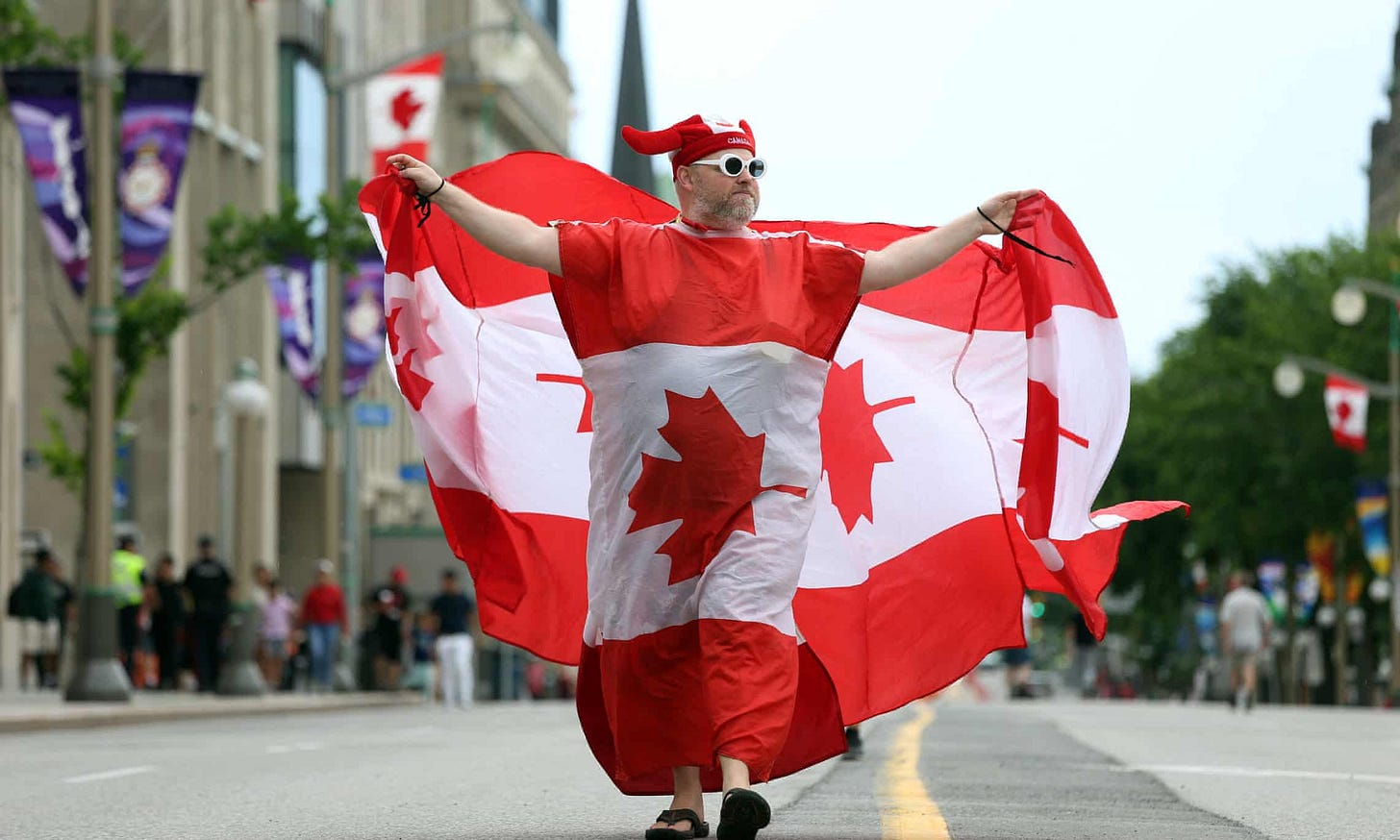Trump Scares Me But So Does Canadian Nationalism
by Riley Yesno
My wife and I went to a PWHL game in Toronto this season. We were lucky to get last-minute seats right on the glass. Our home team, the Toronto Sceptres, pulled out a nice win against the top-contending Minnesota Frost.
At the start, I was fascinated to see that a noticeable percentage of the place stayed seated when the arena was asked to stand for the teams’ respective national anthems. I assumed this was likely in protest to the festering U.S.-Canada dispute. We, too, sat for the U.S. anthem and stayed seated from the Canadian national anthem — something I’ve done since I was a teenager.
When the first line of “O Canada” was belted out, those who sat for the U.S. anthem shot to their feet and I looked to see only my wife and I still sat. The disconnect stuck.
As an Indigenous person, I have never had a fealty to the state. While I love where I live, I don’t think it’s because of the settler colonial state, but despite it. I am grateful to the Indigenous people who have fought to keep this place standing for millennia, no matter who the prime minister may be.
That said, when U.S. President Donald Trump started commenting about Canada becoming the 51st state, my ears, like most people’s, perked up. As outrageous as Trump can be, I also fear he can be dangerously serious — and it is in no way comfortable to be in the eye line of this burgeoning authoritarian.
Yes, Trump frankly scares me. American hegemony scares me. But so does colonial nationalism — a solution a striking number of Canadians have taken up in response to U.S. aggressions. I can’t recall a time in my life where I have seen such a widespread attempt at elevating Canadian nationalism into policy and public life as we are seeing right now.
“Elbows Up!” appears to be the new national slogan; businesses of all stripes are suddenly advertising their Canadian roots — hoping to capitalize on this wave of national pride; beaver and maple syrup symbolism galore.
Certainly, there needs to be a response to would-be tyrants from the south, but I can’t find myself sharing enthusiasm with this current painting of the country in red and white. Particularly since it was not even a year ago that #CancelCanadaDay was trending.
Yes, not so long ago, thousands of people opted to trash their red shirts for orange ones. They found community rallies to attend rather than barbecues or fireworks. And why? Because Canadians had been prompted to spend the day reflecting rather than celebrating; asked to focus on the ongoing genocide and violence that comes with being a settler-colonial state — a prompt advanced primarily by Indigenous people’s tireless labour to show that Canada is not as “nice” as it often purports to be.
To go from that moment to this feels like a particularly annoying whiplash — a reminder of how short Canadian memories can be and how easy it is to forget Indigenous people when times become challenging for non-Indigenous Canadians.
It’s not that I think most Indigenous people would be pro-Trump by any means. It is more that, from this position, it is a lot to live in this patriotic moment — to be asked to embrace one celebrated colonial power for fear of another.
The other day, my mother told me she found this moment confusing. Before this nationalist surge, she had associated people with Canadian flag bumper stickers and flags on their porches as people whose politics she disagreed with; the same people who might have supported the “Freedom Convoy” and subscribed to a vision of “liberty” that was radically individualist. Now, she says, she can’t be sure.
I told her that maybe we can be sure, just about different things.
At the very best, we are seeing innumerable people who are uncritical in their nationalism. Those who are often more scared of foreign aggression than they are focused on domestic policy or their learning to-date.
Ultimately, this is a point to say that while many Canadians are feeling just a whiff of foreign aggression for the first time, remember that Indigenous people are not. We know the threat of encroachment well — in that regard Trump can get in line.
In general, I hope that this can be a time where Canadians continue to be engaged but where they also continue to hold for better at home and remember sovereignty at its true root — the sovereignty of Indigenous people. A force greater than any hockey legacy or maple leaf could hope to be.
Reprinted from The Toronto Star from April 1, 2025 Publication.


